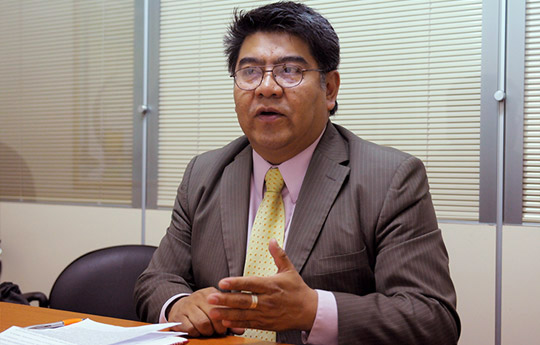INTERNATIONAL COOPERATION
Scientific cooperation as key for research and development
Jesús Mendez Reyes, a Mexican researcher, describes his experience during the Internships for Foreign Researchers’/Experts’ Programme.
At the beginning of 2013, the National Scientific and Technical Research Council (CONICET) presented the Internship for Foreign Researchers’/Experts’ Programme. Twenty scientists from different parts of the world travelled to Argentina to work in institutes of the Council.
The aim of the programme is to promote knowledge sharing by inviting foreign researchers to participate in national research projects, provide advice to young Argentine scientists, contribute to human resources training and to strengthen bonds in order to promote collaboration and development joint actions.
Dr. Jesús Mendez Reyes is an economist, has a Ph.D. in History and specializes in Economic History. He is also a leading expert in cooperativism and participated in the programme. He is a researcher at the Instituto de Investigaciones Históricas de la Universidad Autónoma de Baja California (Tijuana, Mexico) and professor at various academic institutions in Mexico.
“ I am a member of a network of academics interested in cooperativism, the agricultural sector and social economy. While I was talking to a colleague specialized in Argentine cooperatives, she suggested I should contact the Rural Argentina Centre of Studies (CEAR) of the National University of Quilmes (UNQ) to work side-by-side with colleagues on these topics. Later on I obtained this CONICET’s internship for foreign experts and became part of the Centre”, the researcher describes.
Mendez Reyes spent four months in the country, from August to December 2013. “During my stay, I lectured on social economy and cooperativism in Mexico. Besides, I conducted comparative studies about social economy in Argentina and how agricultural and wine cooperatives work. This country also has a lot of experience in cooperativism”.
“Besides, I travelled through the country with colleagues and I came into contact with other institutions, such as the National University of Misiones and the National University of the Northeast. I met specialists of the Institute of Argentine and American History “Dr. Emilio Ravignani” and I contacted the Central Bank of Argentina. There, I was able to check and investigate material from the Prebish and Ernesto Tornquist libraries, specialized in economic and bank history, and agrarian movement”.
The researcher refers to the experience as very positive: “It allowed me to get in touch with people, projects and interact on a daily basis with the researchers, fellows and students of different levels.”
Regarding the role of the researcher, Mendez Reyes affirms that “we need to work on science promotion and explain what researchers do”. Furthermore, he states that “in research centres and universities we not only train human resources but also generate knowledge. But it is necessary to know how to communicate it because it cannot remain in laboratories, books or papers”.
He remarks the role of scientific cooperation for these purposes and highlights that “the promotion of knowledge, new investigations and patents are possible thanks to scientific cooperation because it generates links with other colleagues and spaces”.
Finally, the specialist states that Latin America cannot progress if its countries do not have the chance to examine each other and start working together. “It is vital for us to research and compare studies from different countries so as not to repeat mistakes”, he concludes.
